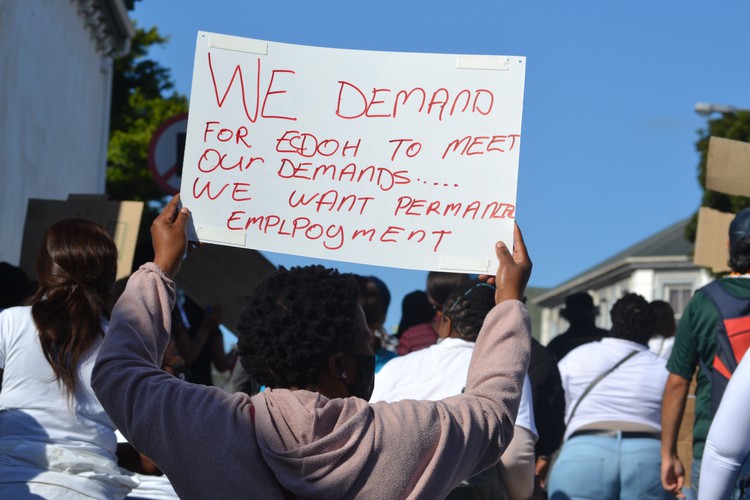Community health workers: arbitrator rules against NEHAWU
Bid to make workers permanent state employees fails
An arbitrator appointed by the Public Health and Social Development Sectoral Bargaining Council has dismissed NEHAWU’s bid to have community health workers permanently employed by the state. Archive photo: Thamsanqa Mbovane
- An arbitrator appointed by the Public Health and Social Development Sectoral Bargaining Council has dismissed a trade union bid to have community health workers permanently employed by the state.
- These workers earn a stipend of about R3,500 a month and are employed on fixed-term, 12-month contracts. They work Monday to Friday in communities across the country.
- The National Education, Health and Allied Workers’ Union (NEHAWU) believes that their contracts contravene the Labour Relations Act.
- But the arbitrator found that the workers are employed through a 2018 collective agreement which validates the provisions of their contracts.
An attempt by the National Education, Health and Allied Workers’ Union (NEHAWU) to have over 47,000 community health workers (CHWs) employed permanently by government has been shot down.
NEHAWU believes that the fixed-term contracts of the workers contravene the provisions of the Labour Relations Act. The Act states that contracts of more than three months cannot be rolled over unless the employer can justify this. “An employer may employ an employee on a fixed-term contract or successive fixed-term contracts for longer than three months only if the employer can demonstrate a justifiable reason for the longer-term.”
The union took the matter to the Public Health and Social Development Sectoral Bargaining Council.
In response, the Department of Health and eight provincial health departments, excluding the Western Cape, argued that the health workers’ conditions are regulated by a collective agreement signed in 2018. This agreement binds the national Department of Health, the provincial health departments, trade unions and their members who fall within the scope of the council’s jurisdiction, and community health workers who are not members of unions but who fall within the scope of the council’s jurisdiction.
The workers are paid a stipend from the Conditional Grants budget.
The health departments also argue that because these funds are not guaranteed, the government cannot risk permanently employing the Community Health Workers.
On 27 October 2021, Advocate Ronnie Bracks, the arbitrator appointed by the Public Health and Social Development Sectoral Bargaining Council, issued an award in favour of the Department of Health and the provincial departments. He found that the workers were all regulated by the 2018 agreement and that this did not contravene the Act.
NEHAWU told GroundUp that the union would continue fighting for the permanent employment of CHWs.
GroundUp has previously reported on the health workers’ efforts to be permanently employed and integrated into the state’s public health services.
Cynthia Tikwayo has been a Community Health Worker since 2011. She is based at the Michael Mapongwana clinic in Khayelitsha, Cape Town, where she works in TB and HIV-care wards and also does home visits to provide basic medical care and to wash bedridden patients.
Tikwayo is a single parent to four children. She works Monday to Friday from 8am to 4pm and receives no employee benefits. She said being permanently employed would allow her to visit a doctor when she is ill and be covered by a medical aid, as opposed to taking money out of her own pocket. “The problem is that we need more money. The R3,700 we currently get is too little. The work we are doing is too much,” she said.
She said a permanent job with the Department of Health would mean “things will be very different for me”.
“I would be able to buy a house for my children, and will also have access to medical aid and I’ll have enough transport allowance for the month,” she said.
Nontuthuzelo Mbuyazwe has worked at Lukhanyiso Clinic in Addo, Eastern Cape, for more than 20 years as a counsellor and in neonatal care, and helps with tracing sick babies and patients in informal settlements. “Every year they just keep renewing the contract, even after 20 years of working there, I’m still a contract worker,” she said.
She works Monday to Friday from 7:30am to 4pm and is paid R3,500 per month.
Mbuyazwe said receiving R3,500 monthly for the amount of work that she does has been taxing. “I will feel so much better if the department can just make us permanent. I would have access to proper benefits like medical aid, a provident fund when I retire, access to paid leave, and just better job security.”
The Department of Health did not respond to our questions.
Support independent journalism
Donate using Payfast

Next: PRASA liable for injuries to man thrown from train
Previous: Our faulty approach to life sentences is catching up with us
© 2021 GroundUp. This article is licensed under a Creative Commons Attribution-NoDerivatives 4.0 International License.
You may republish this article, so long as you credit the authors and GroundUp, and do not change the text. Please include a link back to the original article.
We put an invisible pixel in the article so that we can count traffic to republishers. All analytics tools are solely on our servers. We do not give our logs to any third party. Logs are deleted after two weeks. We do not use any IP address identifying information except to count regional traffic. We are solely interested in counting hits, not tracking users. If you republish, please do not delete the invisible pixel.

